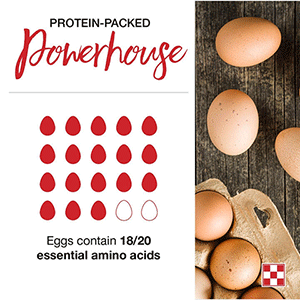
Egg Nutritional Facts
Flock Management : Egg Benefits

Eggs are a staple on breakfast tables around the country – packed with protein, vitamins, minerals and essential amino acids to help you and your family have a great start to your day (or really any time of the day – breakfast for dinner anyone?).
Let’s take a deeper dive into egg nutrition facts and learn how what chickens eat impacts the nutrition content of an egg.
 Protein content in eggs
Protein content in eggs
The egg shines as the most perfect source of protein in the world. Protein sources are ranked in order of the completeness of their amino acid profile, relative to the needs of humans, as well as their digestibility. They are then given a score known as the “biological value.”The egg scores the highest of all proteins and is the gold standard against which all other proteins are measured. One large 50-gram egg provides 7 grams of digestible protein.
Amazing amino acids in eggs
Amino acids are the building blocks of proteins. There are 20 of them, 10 of which are essential, meaning our bodies cannot make them so they must be provided in our diets.The egg has the best amino acid profile known — better than meat, milk and soy products. Not only does the egg contain 18 of the 20 amino acids, but it also contains all the 10 essential amino acids in abundance.
One large 50-gram egg provides nearly seven grams of highly digestible protein. Eating two eggs for breakfast fulfills about 28 % of the protein needs of the average six-foot, 180-lb. active male, and almost 40 % of the needs of a 5’5”, 125-lb. active female — all for a grand total of only 140 calories.
Egg nutrition: Vitamins and minerals galore!
The high amount of quality protein content of an egg would be enough to make it an amazing addition to any diet, but it doesn’t stop there. The egg is also a rich source of choline, a nutrient essential for fetal brain development and to help prevent birth defects.Eggs also provide significant amounts of B vitamins, (especially B12, which isn’t found in plant foods unless they’re commercially fortified), as well as the minerals selenium, phosphorus, iron, zinc and calcium.
Eggs are one of the very few naturally occurring and significant sources of vitamin D in our diets, and they’re also a source of lutein, a compound shown to be helpful in addressing age-related macular degeneration and cataracts. In fact, about the only nutrient lacking in eggs is vitamin C.
How to boost egg nutrition
Despite its apparent nutritional perfection, egg nutrition content can be enhanced even more by feeding your hens a high-quality diet.Hens are very good at incorporating what they eat into the developing egg. Hens fed ground flaxseed will produce eggs with a much higher level of alpha-linolenic acid (ALA), an important omega-3 fatty acid, while those fed algae meal will lay eggs with higher amounts of docosahexaenoic acid (DHA), another very valuable omega-3 fatty acid.
Today’s poultry feeds also include a higher level of vitamin D, therefore increasing the concentration of vitamin D in eggs. Even the color of the yolk is influenced by the feed your hens eat!
Great feed improves chicken egg quality
You might remember your grandparents feeding their chickens unfortified scratch grains or table scraps, but today we now know much more about nutrition needs of both chickens and humans than we did back then.Feeding chickens a poor-quality diet means not only will the egg nutrition content suffer, but your hen’s production will likely decrease and her eggshells will be thinner (and no one wants broken eggs!).
Team Purina researchers have worked hard to determine the nutritional requirements of chickens and to develop feeds that meet those requirements. Purina® Layena® Plus Omega-3 has all the nutrients hens need and helps your birds produce eggs with more omega-3 fatty acids than store-bought eggs.
Feed your chickens a high-quality diet and treat your family to nutritious eggs every day! Learn more about egg nutrition facts and tips for feeding your flock by signing up for our email program.




